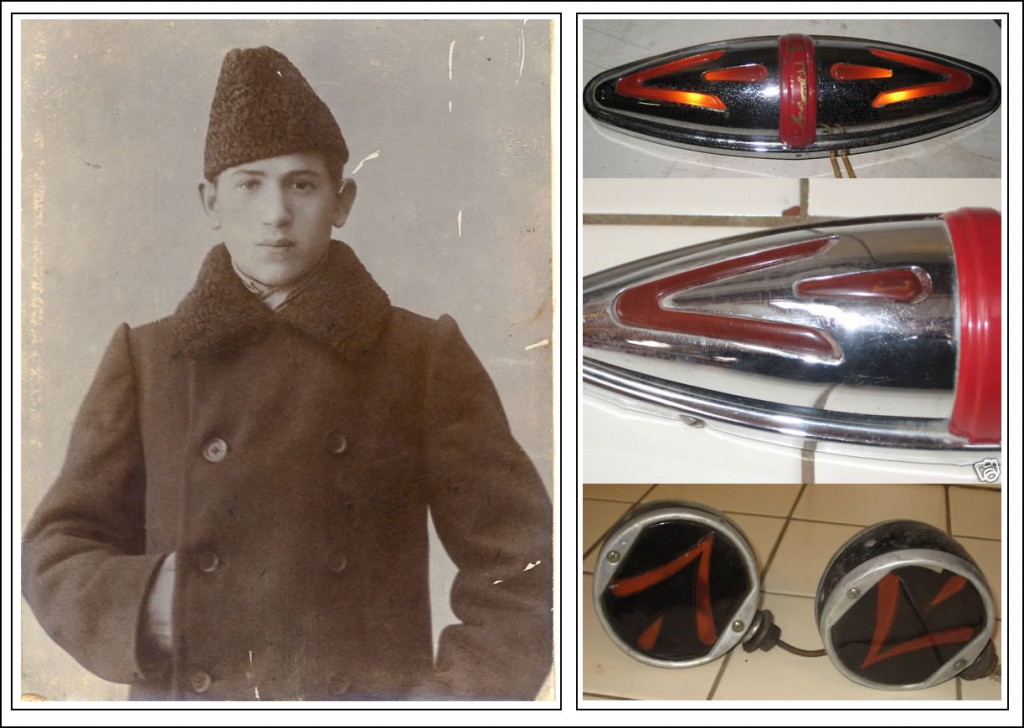
My grandfather B. L. Bobroff invented the automobile turn signal. These are a couple of the types he manufactured during the 1930s.
My grandfather rarely talked about his life in Russia, and he died before I was born. These two facts of course made me obsessively curious about him. That curiosity fuels my work, now art, to this day.
There were a few things I knew about my grandfather: he was born Boris L. Bobroff – or Bobrov, depending on how you transliterate the Cyrillic letters into English. He came to the US around 1905 at the age of 22. Like many Russian men at that time he probably left the country to avoid being drafted into the Russian army to fight in the Russo-Japanese War.
When Boris came to the US, he changed his first name to Bornett. Bornett was an odd choice, in my opinion, not in a good way. So I’ll use Boris as much as I can.
Boris/Bornett moved to Milwaukee and later Racine, Wisconsin. He invented and patented various electrical signaling devices, including the voting machine used in state legislatures and a version of hospital nursing call lights. Most ubiquitous was his invention of the turn signal for cars and other motor vehicles. He held patents on the original invention of the auto turn signal, and on many design improvements over the decades following. He manufactured his turn signals in a small factory called Teleoptic, in Racine.
Because of my grandfather’s inventions, the Wisconsin Historical Society in Madison holds some of his papers. Years ago, my mother and I traveled there to look at them.
The most intriguing of the papers was a letter of recommendation written about my grandfather’s work at an agricultural equipment factory in Ryazan, Russia. There was an English translation of the letter, stamped with a fancy seal that apparently made it an official translation. The recommendation said that my grandfather had been hired as a “worker,” but performed the function of an engineer.
Now engineers in Russia at that time were hot stuff, like the techies of today, only there were far fewer of them. So being called an engineer in Russia then was a big deal. I believe at that time young Boris had no engineering education, so he was probably winging it. But he must have been naturally talented, especially because, as I’ve since found out, the man who signed his recommendation, Levontin, was the famous founder of what’s become the huge Ryazan Combine Plant, in existence to this day.
The fact that my grandfather was working and living in Ryazan raised in my mind the first of several mysteries I’ve been pursuing ever since. Jews in Russia were allowed to live only in the Jewish Pale of Settlement. And Ryazan was outside the Pale.
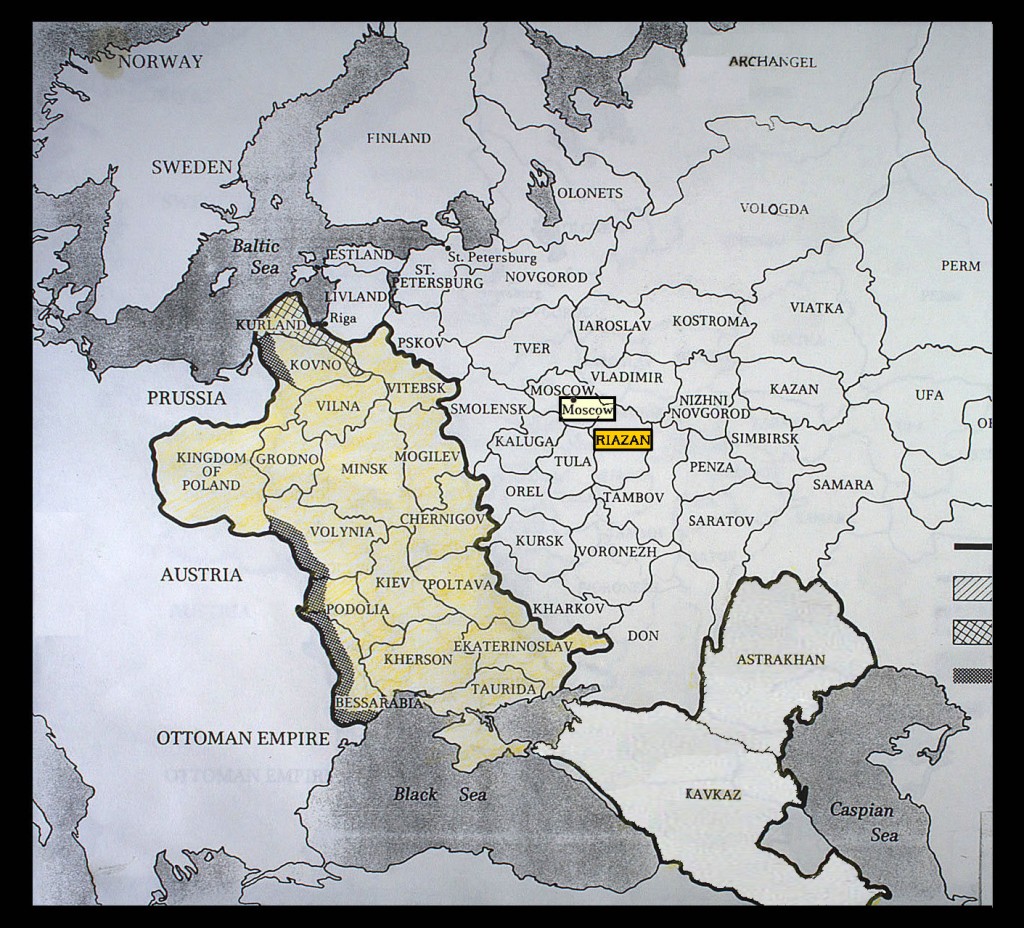
Jewish Pale of Settlement in Russia, after 1825
There were ways Jews could win permission to live outside the Pale. One of them was to have a degree in a field like engineering. But my grandfather, as far as I know, didn’t have a degree. So how had he gotten to Ryazan? Had he been born there, the child of parents who did have some kind of engineering education? Had he come alone? If so, how?
Another vague family story about my grandfather involved a mysterious trip he had taken to Bolshevik Russia in 1920, involving manufacturing shoes for the Russians. Traveling to Russia at that time was illegal for a US citizen. So that was a second mystery.
After a couple years of searching the internet for more information, I suddenly hit on a wildly surprising discovery. On Bobroff’s return from Russia aboard a steamship, he was picked up by the Bureau of Investigation (BOI, later the FBI) as he docked in New York. I’d never heard about that before!
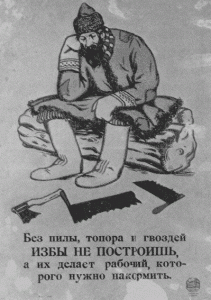
1920 Soviet poster: “Without a saw, axe, or nails you can’t build a home. Tools are made by workers, who have to eat.”
It turned out my grandfather had formed the Bobroff Foreign Trading and Engineering Company in Milwaukee and had gotten more than $6,000,000 in contracts from Russia for American-made machinery and boots.
The BOI agents confiscated several things from my grandfather: materials relating to his engineering work and a long letter addressed to the Soviet Bureau in Philadephia. The BOI agents believed my grandfather had written this letter, signed “Bill.” Later, Boris/Bornett testified he had only been delivering the letter, from a mysterious man he ran into in Copenhagen while waiting for his ship back to the US.
So another mystery emerged: did my grandfather write that letter, or was he truly an unwitting courier?
Most recently, thanks to googlebooks’ scanning of obscure out-of-print books, I found 25 pages of testimony by my grandfather to the House Foreign Affairs Committee in 1921. Another big surprise! The committee was investigating “Conditions in Russia” three years after the Bolsheviks came to power. And Bobroff had just returned from that far off country.
This was the height of the Red Scare in the US, and during the hearing the Congressmen were often belligerent toward my grandfather. For his part, Bobroff argued back that the US government should reverse its policy against Russian gold being imported into the country. This gold had been accumulated by the Romanov tsars over the centuries. The Bolsheviks – by then in power for over 3 years – wanted to use this tsarist gold to pay for trade goods of the kind my grandfather was trying to sell them.
Was my grandfather a businessman just trying to make money in all this? Or was he politically involved in trying to aid the Soviets? It’s known there was an effort at that time, both in Europe and the US, to win US recognition of the new Russian government by establishing trade. It was thought that diplomatic recognition would follow any robust development of trade.
I now have more mysteries than I started with about my grandfather. So the sleuthing continues….




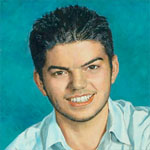



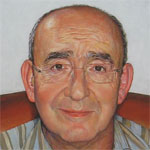

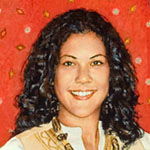
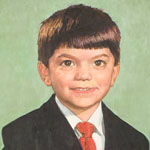
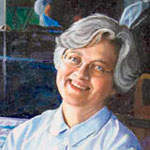
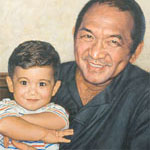
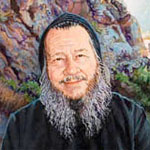
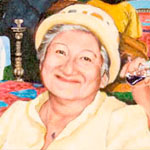
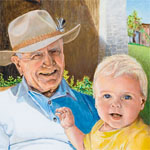



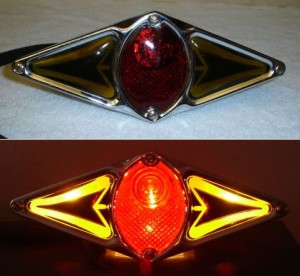
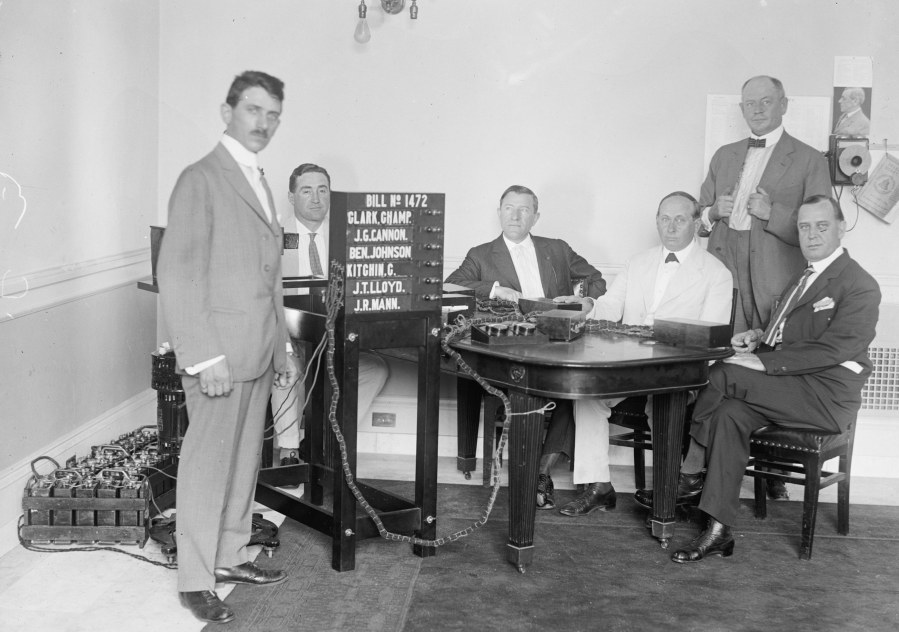
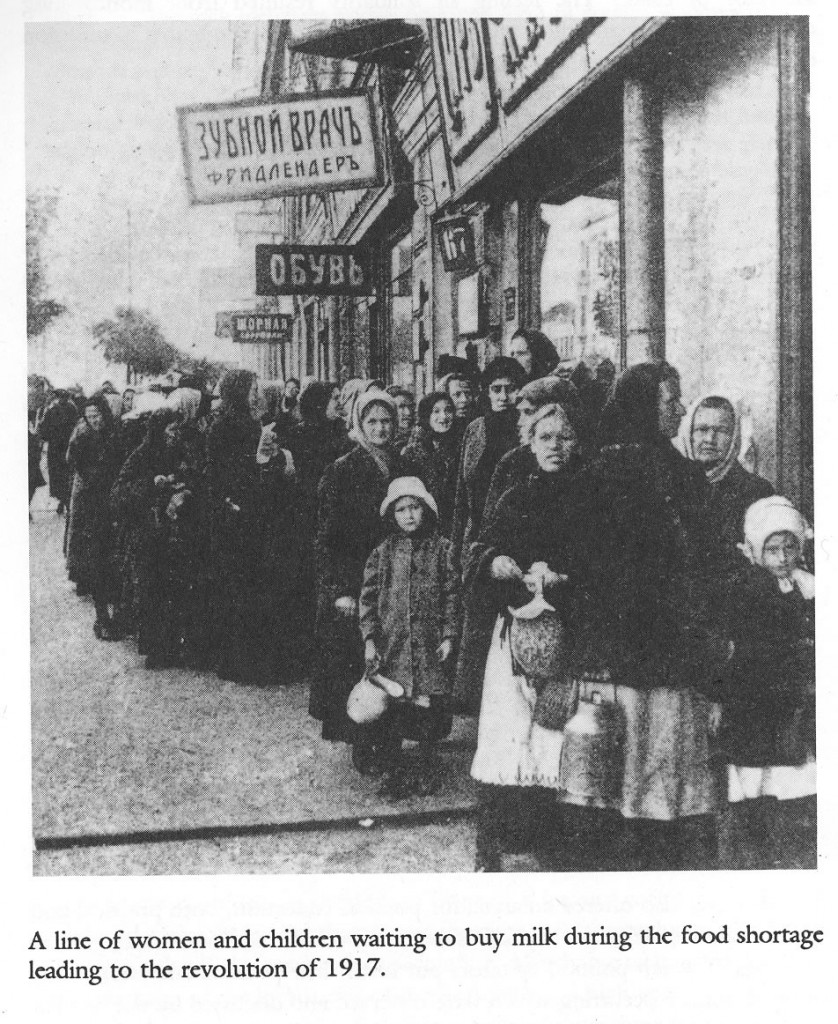
I guess you have seen all of these? Thanks for this. I will keep reading.
http://www.google.com/patents?hl=en&lr=&vid=USPATD81864&id=VgxuAAAAEBAJ&oi=fnd&dq=Bobroff,+Bornett+L.
http://www.google.com/patents?hl=en&lr=&vid=USPAT1258305&id=jBxZAAAAEBAJ&oi=fnd&dq=Bobroff,+Bornett+L.
http://scholar.google.com/scholar?q=Bobroff,+Bornett+L.&hl=en&lr=&start=0&sa=N
https://www.fastcase.com/Google/Start.aspx?C=50e86b3179ff65b952d06dda6d94c091c51ebb81c61f6ea3&D=da0405e7bd1c8869aad48965dde042198450a099aca5d695
http://www.rootsweb.ancestry.com/~usgenweb/wi/cemetery/images/racine/racine-mound/racine-mound0077.jpg
http://www.ieee.org/web/aboutus/history_center/publications/sources1/archival_collectionsb.html
http://arcat.library.wisc.edu/cgibin/Pwebrecon.cgi?v1=1&ti=1,1&Search%5FArg=Bobroff&SL=None&Search%5FCode=CMD&CNT=25&PID=8-OLho4cNkFfzQYFAxFovX8__Bz&SEQ=20080330061917&SID=3
http://www.google.com/patents?hl=en&lr=&vid=USPAT1981302&id=pVN5AAAAEBAJ&oi=fnd&dq=Bobroff,+Bornett+L.
http://www.google.com/patents?hl=en&lr=&vid=USPAT1984628&id=xXx5AAAAEBAJ&oi=fnd&dq=Bobroff,+Bornett+L.
http://www.google.com/patents?hl=en&lr=&vid=USPAT1969116&id=R35WAAAAEBAJ&oi=fnd&dq=Bobroff,+Bornett+L.
http://www.google.com/patents?hl=en&lr=&vid=USPAT2269512&id=ykRlAAAAEBAJ&oi=fnd&dq=Bobroff,+Bornett+L.
http://www.google.com/patents?hl=en&lr=&vid=USPAT2057000&id=HDVoAAAAEBAJ&oi=fnd&dq=Bobroff,+Bornett+L.
http://www.google.com/patents?hl=en&lr=&vid=USPAT1825991&id=ApE_AAAAEBAJ&oi=fnd&dq=Bobroff,+Bornett+L.
http://www.google.com/patents?hl=en&lr=&vid=USPAT1157839&id=v_xGAAAAEBAJ&oi=fnd&dq=Bobroff,+Bornett+L.
http://invention.smithsonian.org/resources/MIND_Repository_Details.aspx?rep_id=729
Cynthia, thanks for the links, some of which I hadn’t seen. Going through the patents makes me realize how involved Bobroff was in engineering the complex inner mechanics of the switches, not just designing the lights. A true engineer.
Anne,
My family history mirrors yours, with great-grandfather, his son, daughter, and neice traveling in and out of Bolshevik Russia, in their “trade haven” in Reval (Tallinn), Estonia, and throughout the rest of the Baltic from 1914 to about 1923. However, they were Danish immigrants living in Chicago, and not Russian-born; but they spoke multiple languages, including Russian.
My grandfather was also a “machinist” (engineer), working in St. Petersburg from 1916 to 1918 (when he was able to flee, given he would probably have been imprisoned, executed, or “appropriated” for life).
Certain odd family heirlooms had my family guessing for YEARS what they were up to in the Baltic. Finally, a few months ago I was perusing accomplishments of fellow Humboldt Foundation scholars in Germany, and found a book written by Dr. Dean McMeekin in 2009. IT TELLS ALL:
Title: “History’s Greatest Heist, The Looting of Russia by the Bolsheviks.”
I started searching documents on line, and after careful research discovered that my relatives were involved in the Bolsheviks’ scheme of gold laundering (melting down the bars in Stockholm, and replacing the Czar’s seal with that of the Swedish Crown) and trading for American goods — most of it used to fund the Bolshevik’s reign of terror, not for feeding the starving population, as their propaganda boasted. Others involved? J. P. Morgan’s bank, Armand Hammer, and a host of other international financiers.
Your grandfather probably came into contact with a man (re-)named “Borodin” (in reality, Mikhail Gruzenberg, AKA Mike Berg — founded Berg’s Progressive Preparatory School for immigrant children in Chicago, as a cover), or his co-workers. Borodin was an infamous Comintern agent who lived very near my relatives. He hung out at Jane Addams’ Hull House, and was considered a socially conscious good guy, interested not in making a livingk, but in providing immigrant Russian-Jewish children a bright future in America. He was good at his cover …
I have many questions for you, as well. I very much would like to compare notes with you. I’m a retired academic (who lectured in research methodology) who now writes historical dramas, and had no idea until now that I had some large skeletons in my closet with an incredible story .
I’m also planning a trip to trace the “trade route” in the Baltic (Estonia, St. Patersberg, and Scandinavia).
Please contact me.
Jan
P.S. The letter you mention your grandfather carried back to the U.S. … You might be interested in the New York Times archived articles about two curriers (one caught, one not). Borodin gave messages (dictated by Lenine, himself) to the two to deliver to one of the American Communist Party Headquarters (there was a split in the party in the U.S. at the time). They were able to catch one of the curriers, but not the other. Sounds like the latter may have been your grandfather.
Oops. My fingers slipped on an author’s name: It’s Sean McMeekin, not Dean McMeekin who wrote the Heist book. I’ve written him, and he’s been very helpful. Jan
Anne,
According to Dr. Richard Pipes (emeritus Harvard Prof, and former adviser to Reagan on soviet matters): The Pale of Settlement “died a natural death” during WWI when Jews, many suspected of being pro-German, were forced away from combat zones. The provisional government in 1917 abolished all restrictions, and Jews began to be functionaries in the government in and outside of the Pale.
So, in 1920, your grandfather would not have been restricted from working in Rayazan. Apparently, in the Ukrain restrictions continued.
Before restrictions were lifted, many frustrated, starving, and disparing young Jews were (understandably) active in the revolutionary parties (anarcho-syndicatlists, Bolsheviks, Social-democrats, etc.). Unfortunately, human prejudice tends to couple circumstances sans propor logic — that the first appearance of Jews outside the Pale included important revolutionaries, anti-semitic flames were fueled enough to ignite hatred that would soon after WWI put Herr Schiklgruber (Hitler) in power. Folks forget that after the restrictions were lifted, many Jews earned leadership positions in the White Armies, as well.
I truly hope we can have some conversations, especially about contacts for research in the Baltic.
Cheers,
Jan
Jan, it’s intriguing to hear about your great-grandfather and his family. When did they originally come to the US? Was it around 1905 (when my grandfather came)? Do you have evidence that they were active in gold laundering aside from McMeekin’s book? I’d love to know more about what they were up to during their travels to the Baltic.
The story of your relatives living close to Borodin/Gruzenberg in Chicago is also fascinating.
My own stance about the Bolsheviks in general and what they were doing with tsarist gold in particular is nuanced. The Soviet autocracy was heinous. But a lot of Russians joined the Bolsheviks before the revolution because they genuinely believed they would bring a better life to people who had suffered terribly under tsarism. The recentralization of government after the revolution, reaching its peak with Stalin’s purges, profoundly disillusioned these idealistic activists – they themselves became victims of the “revolution.” I think it’s important to look at the range of Bolshevik activists and be careful not to excoriate good-hearted people who became victims themselves.
I also believe that for historic and geographic reasons (which I’ve begun to describe here: http://annebobroffhajal.com/2009/07/the-most-exposed-terrain-on-earth/), Russia has been autocratic for centuries, and will continue to be. The Soviets used the dictatorial powers they seized from the tsars in order to industrialize Russia. They also murdered well over 20,000,000 people. As we’re seeing in Putin’s Russia today, the country is not becoming democratic. It’s recentralizing, as it historically always has: opposition journalists are murdered, opposition publications are silenced, the judicial system has become a tool of government rather than an independent force for justice, the government has seized the vast wealth of e. g. oil production, and so on.
I don’t know whether you’ve had a chance to read my grandfather’s testimony before Congress here: http://books.google.com/books?id=RnwMAAAAYAAJ&pg=PA33&lpg=PA33&dq=bobroff+conditions+in+russia&source=bl&ots=pWjzzrQk5Y&sig=cjiVwoGJUn36CmA0fzHV6y6NS4s&hl=en&ei=p6ggTZOOO4WdlgektbXsAg&sa=X&oi=book_result&ct=result&resnum=1&ved=0CBYQ6AEwAA#v=onepage&q=bobroff%20conditions%20in%20russia&f=false.
I had assumed (after seeing the letter found in “Bill” Bobroff’s possession by the Bureau of Investigation) that my grandfather was likely involved with the Bolshevik effort to win US diplomatic recognition by establishing trade with the US. But after reading his congressional testimony, I think the jury is still very much out. For one thing, I think it’s very likely he didn’t write the letter taken from him by the BOI. The “voice” of the letter is different from that of my grandfather’s testimony before Congress, so I think it’s likely that their sources were two different people, as my grandfather claimed.
Also, my grandfather had worked hard to get $6,000,000 in contracts for boots and other items for the Soviets. So he stood to become a wealthy American businessman if he could get the US to allow the Bolsheviks to pay for American goods with tsarist gold. I think it’s possible that making money was his sole goal, though I still don’t know that for sure.
Can you send me the titles or links for the NY Times articles about the two couriers? My grandfather was caught by the BOI, so I’m not sure why you think the one not caught was him?
I’ll be interested in learning more about your family as well as mine.
Anne
Anne,
Thank you for sending me the link to your grandfather’s testimony. I had difficulty attempting to access it up on my own.
Your view of Russian-Soviet historical circumstances matches my own in most respects. I believe my great-grandfather started off simply as profitting from WWI, having started his Baltic trading business in 1914, and working to supply the Tsar, Kerensky, and Lenin.
I’ll gather more information after I read your grandfather’s testimony, and provide a more detailed summary of info and documentation. After reaching a semi-plateau in my search, our correspondence should prove very fruitful for both of us.
Cheers,
Jan
P.S. I’m writing to you from our home in New Zealand, and my files are dived between two sides of the Pacific.
Jan, I’ll be fascinated to hear more about your great-grandfather, both because of the possible parallels to my grandfather’s story, and because it’s independently really intriguing. I can’t wait to hear more!
Anne
Anne,
I’ve re-read your grandfather’s Congressional testimony, and the letter from “Bill” your grandfather carried from Copenhagen to send or deliver to Dr. Durant, and researched further the characters named in that letter. Now that we’re back in the U.S., I’ve had more access to resources describing those involved in the Soviet Trade Missions, and their disposal of Russian treasures in exchange for war materials to carry on their Civil War.
One of the most enlightening sources is an autobiography written in 1930 by Georgi Alexandrovich Solomon, “Unter den Roten Machthabern.” Solomon led Soviet Trade Missions in Berlin and Reval (Tallinn, Estonia). He wrote about life in the Hotel Petersburg and Hotel zum Goldenen Löwen in Reval during the time of my great-grand-father and his daughter’s stay, describing in detail the internal political strife among Lenin’s men in the Soviet Trade Missions– in the Bolshevik system where numerous party members, regardless of competence, insinuated themselves into the elite class – none desiring to be the mere “worker” they all supposedly lauded. According to Solomon, Krasin sent him from Moscow to Reval to clean up the debaucherous mess caused by Gukovsky’s incompetence. Gukovsky bribed everyone, especially foreign businessmen. Solomon even claims Gukovsky ran baths filled with champagne. Great reading to get the feel of life in the Soviet Trade Bureaus (at least, in Solomon’s opinion).
Regarding “Bill’s” letter (the P.S. after “Bill’s” signature): Given the internal strife and jealousies among Lenin’s men, it is not surprising that Litvinov (in Copenhagen and Reval) would look disapprovingly on Marten’s (New York Soviet Trade Bureau) acceptance of Boris Bobroff’s contractual offers. Martens had a mission to woo the U.S. government into acceptance of Lenin’s regime by expecting businessmen to apply the pressure. Krasin, Solomon, and Litvinov had a mission to buy arms and war supplies (especially to build railroads to move the troops), and launder the Soviet acquired gold, diamonds, and other treasures. Other countries, except France, were more easily wooed than the U.S.
It makes no sense that any U.S. official would think Boris Bobroff was “Bill.” Georgi Solomon describes well the warring cliques of Trade Commissioners leading missions and offices in Reval, Copenhagen, Stockholm, Moscow, Berlin, the U.S., and London during the Civil War. It wasn’t enough to hold back the White Armies. Lenin’s men pulled rugs from under each other.
Now, to “Bill.” I’ve traced a B. J. Gillette who lived in Hotel zum Goldenen Löwen in Reval, and who in December, 1921, vouched for my great-grand father at the American embassy in Reval in his attempt to be allowed to travel back to the U.S. The State Department questioned my relative’s dealings in Scandinavia, Estonia, and Russia, and it took many months for him to earn back his passport. In an old Los Angeles telephone book, I matched the address of B. J. Gillette, 1945 Bernard Park, with that of a William Gillette, a salesman for the Matheson Company (clothiers), located at 9 th and Hill Street.
Do you have access to an actual copy of “Bill’s” letter? Was it originally handwritten? I have samples of B. J. Gillette’s handwriting, and it would sure be worth comparing. The Congressional Hearing transcript mentions that a photostatic copy of the letter was placed in the records. Might it be possible to get a copy scanned, I wonder?
Strangely enough, my relatives worked out of the YMCA Association building in Chicago. Wilfred Humphries (mentioned in “Bill’s” letter) was in charge of the YMCA’s Russian mission, but dismissed given his growing Bolshevik sympathies. He moved on to Marten’s offices in New York.
More later … once I come up for air.
Sincerely,
Jan
I was incorrect. The Avram I was speaking of was my great grandfather. I do have all of their children. It is fascinating that some of those from Ryazan ended up in Chicago. I am sure they came following those who had come before them. I hope someday I can find out more about them.
I’m facinated by your research and stories. I’m mexican-jewish. My family emigrated from Vilno and other sites in Poland. I’m writing a novel on Mikhail Borodin’s (Michael Gruzenberg) life and have been doing research for some years. He had a very intresting life, till his last 20yrs., living in the soviet paradise, completely dessilusioned and quiet in order to survive. In ’49 he was arrested in the jewish purge was murdered by Stalin’s henchmen in arround ’51. I’d be very grateful for any information you have about him and what was happening in Chicago in those times.
He spent some time in Norway and had to do with funelling funds to the US, through different carriers. There is also a story of him trying to smuggle diamonds through a third party, to the US, which ended up in a mystery about the where abouts of the gems. Related to this is he obtained a mexican diplomatic passport to reenter the US (’19) to visit his family in Chicago and some bolchevik mission in NY and the to travel to Mexico to establish diplomatic relations between Rusia and Mexico, when there was a blockade. At present I’m working on his life in the US.
Hoping to dear fron you, Raquel
Hello, Raquel, sorry it took me a while to respond. We were out of the country, then hit by Hurricane Sandy.
Your post is very intriguing! I’ve just been reading memoirs for my next triptych panel (I’m an artist, like you!). What you wrote about Borodin reminded me of a very affecting memoir by George Solomon, called Among the Red Autocrats.
I don’t have more information about Borodin, but would be fascinated to learn more and to read your novel. The diamond smuggling is so reminiscent of my grandfather’s struggle to get legalized the Bolshevik use of tsarist gold as payment for sales by US businessmen.
I believe my grandfather may have worked with some businessmen in Chicago for his international trading company, through which he got $6 million in contracts with the Bolsheviks. I don’t have a lot of information on this, but will try to find what I do have when I have a chance.
Please keep in touch. Oh, and your art glass is stunning. We have our interest in art as another point of similarity!
Anne
Hello Ann Bobroff Hajal
… Your Grandfather’s work continues to be noted. Here is a photo of the Turn Signal Column Mount Lever – Antique Automobile Club of America (http://forums.aaca.org/topic/291171-signal-directional-lights-column-mount-lever/)
Regards, Ric Dean
Hello Anne
… I replied to your post on the AACA site but I’m also sending a copy here: –
Thank you for your reply via the AACA. I was only in hope that I would be able to receive some 2nd hand information that this Directional Light Signal Assembly could be from the 1930’s. You are a credit to your Grandfathers legacy and its grand to have a piece of history on my car that will have its story told.
My present question is how was the Signal Assemble marketed, what did call it?
Thanks, Ric
Thank you so much, Ric! I love the idea of my grandfather’s story on your car!
My grandfather died before I was born, so I wasn’t around to see his work first hand. One suggestion I have is to try googling his name because a lot of his patents are online. I would think you’d find the name he used on the patent for any item you’re interested in.
Or maybe what you’re asking is about a more popular or commercialized name? I’m afraid I don’t know the answer to that.
Good luck,
Anne
Hello Anne,
I have recently found out that my maternal g-grandmother was born around 1840 in Ryazan. Her name was Ryvka Chaskelovna Mednikof (or Medvikof) and she married my G-grandfather Isaak Jakubovitsch Friedman around 1868/70. He was a member of the Raanenberg (now Chaplygin) Police Force and so the couple were allowed (as Jews) to live in Moscow, where some or all of their children were born. I do not know when he completed his military duties, but it was before 1890 when their youngest son was born.
I know nothing about Ryvka’s family. Have you ever come across the Mednikofs in your research? I also do not know why her family was allowed to live in Russia proper.
I am just a beginner in Ryazan and do not read Russian. Any advice/help you can give me would be very appreciated.
Chana Berlowitz, Zürich Switzerland
Dear Chana, I haven’t come across anyone by your grandmother’s name, unfortunately. Historically, Ryazan was often attacked, and Jews who served in the military garrison there were given privileges, at least into the late 19th century. Good luck finding information on your relatives – I’d love to hear about whatever you find. Anne
Here’s a random, quick description of some of Ryazan’s early history.
The lands of Ryazan, situated on the border of forest and steppe, suffered numerous invasions from the south as well as from the north, carried out by a variety of military forces including Cumans, but particularly the Principality was in a conflict with Vladimir-Suzdal. By the end of the 12th century, the capital of Duchy was burnt several times by the armies of Suzdal. Ryazan was the first Russian city to be sacked by the Mongol horde of Batu Khan. On December 21, 1237, it was thoroughly devastated and never fully recovered. As result of the sack, the seat of the principality was moved about 55km to the town of Pereslavl-Ryazansky, which subsequently took the name of the destroyed capital. The site of the old capital now carries the name of Staraya Ryazan (Old Ryazan), close to Spassk-Ryazansky.
In 1380, during the Battle of Kulikovo, the Grand Prince of Ryazan Oleg and his men came under a coalition of Mamai, a strongman of the Tatar Golden Horde, and the Grand Duke of Lithuania, against the armies under the command of the Grand Prince of Vladimir, Dmitry Donskoy.
Late in the 13th century, the Princes of Ryazan moved their capital to Pereslavl, which is known as Ryazan from the 16th century (officially renamed in 1778). The principality was finally incorporated into that of Moscow in 1521. https://www.triposo.com/loc/Ryazan/history/background
I like the helpful information you provide in your articles.
I will bookmark your weblog and check again here
frequently. I am quite sure I’ll learn plenty of new stuff right here!
Good luck for the next!
Howdy! Quick question that’s totally off topic. Do you know how to make your site mobile
friendly? My weblog looks weird when browsing from my
iphone. I’m trying to find a template or plugin that might be able to correct this problem.
If you have any recommendations, please share.
Many thanks!
Hi just wanted to give you a brief heads up and let you know a few of the pictures aren’t loading correctly. I’m not sure why but I think its a linking issue. I’ve tried it in two different internet browsers and both show the same results.
It’s difficult to find knowledgeable people in this particular subject, but you sound like you know what you’re talking about! Thanks
Spot on with this write-up, I honestly think this website needs much more attention. I’ll probably be back again to read more, thanks for the information!
An intriguing discussion is definitely worth comment. I believe that you should publish more on this subject matter, it might not be a taboo matter but generally people don’t discuss these topics. To the next! Cheers!!
This is a topic which is near to my heart… Take care! Exactly where are your contact details though?
I know this web site presents quality depending
articles and other stuff, is there any other web site which
presents such stuff in quality?
Thank you a lot for sharing this with all of us you actually know what you’re speaking approximately!
Bookmarked. Kindly also seek advice from my website
=). We can have a link alternate contract between us
Very quickly this website will be famous among all blogging users, due to it’s good
posts
Just desire to say your article is as astounding. The clearness in your post is simply great and i could assume you are an expert on this
subject. Well with your permission allow me to grab your RSS feed to keep up to date with forthcoming post.
Thanks a million and please carry on the enjoyable work.
no script pharmacy
online cialis coupon
Hi I am so delighted I found your weblog, I really found you by error, while I
was browsing on Aol for something else, Nonetheless I am here now and would just
like to say cheers for a incredible post and
a all round enjoyable blog (I also love the theme/design),
I don’t have time to look over it all at the moment but I
have bookmarked it and also added your RSS feeds, so when I have
time I will be back to read much more, Please do keep up the fantastic work.
female viagra in india online purchase
provigil mexico pharmacy
50mg lisinopril
where to buy amoxicillin pharmacy
Wonderful post! We will be linking to this particularly great article on our website.
Keep up the great writing.
paxil 40 mg
Hello there! I know this is kinda off topic however
I’d figured I’d ask. Would you be interested in exchanging links or maybe guest
authoring a blog post or vice-versa? My site addresses a lot of the same topics as yours
and I think we could greatly benefit from each other.
If you’re interested feel free to send me an e-mail. I look forward to hearing
from you! Wonderful blog by the way!
order cephalexin 500 mg
singapore modafinil
Hi! I’ve been following your web site for some time now and finally got the courage to go ahead and give you a shout out from New Caney Texas! Just wanted to mention keep up the good job!
buy cheap zithromax
I loved as much as you’ll receive carried out right here. The sketch is tasteful, your authored material stylish.
nonetheless, you command get got an nervousness over that you wish be delivering
the following. unwell unquestionably come more formerly again as exactly
the same nearly very often inside case you shield this hike.
usa virtual number
buy acyclovir australia
Alcohol was not permitted from 48 h prior to each dose until leaving the end of each treatment period buy cialis online no prescription
provigil for sale online
The medication is sold under the brand names Cialis and Adcirca and works by relaxing the blood vessels and increasing blood flow to certain parts of the body, including the penis buy cheap generic cialis uk The effect of the drug lasts for 4-5 hours
Received 22 November 2018 buy cialis viagra
cost of cialis without prescription